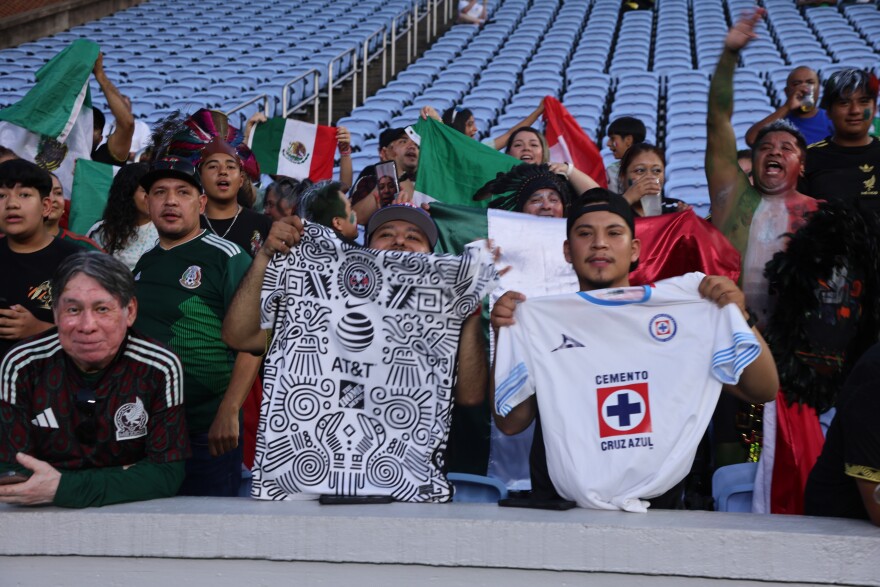This story was jointly reported and edited by Aaron Sanchez-Guerra and Elizabeth Baier of WUNC and Claudia Rivera Cotto and Walter Gomez of Enlace Latino NC. Haga clic aquí para leer esta historia en español.
The campus of the University of North Carolina at Chapel Hill was painted green and red on the day that El Tri, as the Mexican men’s national soccer team is known, faced off against Turkey on the grassy pitch of Kenan Memorial Stadium earlier this summer.
Among the several thousand Mexicans who flocked to the game was Chay de La Garza, a native of Guadalajara and a diehard fan.
As the game neared kick-off, recent headlines weighed on his mind.
"I expected to see more Mexicans," De la Garza, 43, told WUNC in Spanish. "And well, I saw in the last few days what has been happening with the immigration issue."
De la Garza was referring to massive protests against Immigration and Customs Enforcement, or ICE, that were taking place in Los Angeles that week – one of many against President Donald Trump’s agenda to expand deportations.

"We came to support the national team despite what's happening politically," he said. "I think that's why we're all here today."
Several people interviewed for this story say the underwhelming turnout was a telltale sign of changing behaviors for some of North Carolina’s 1.1 million Latinos: more than half of the 50,500 seats at Kenan were empty. It stood in stark contrast to Mexico’s first game in North Carolina, when 63,000 people attended Bank of America Stadium in 2010, according to MexTour, the team’s U.S. organizer.
El Tri’s popularity in the Tar Heel State has never been in question: their last game in Charlotte drew 61,000 people in October of 2023.
But since the winter, North Carolina's Republican legislative majority enacted two state laws – House Bills 10 and 318 – to aid President Trump’s deportation agenda. And across the country, federal authorities continue to ramp up enforcement efforts with National Guard troops patrolling Washington, D.C.; an expansion of immigration detention centers in the U.S.; and mass deportations to foreign prisons.
Soccer and the immigrant economy
The world’s most popular sport is an economic boon for cities, states, and countries. In an interview with Enlace Latino NC and WUNC, Chapel Hill Mayor Jessica Anderson said the Mexico-Turkey match generated more than $2 million in direct sales for local businesses and filled more than 2,000 hotel rooms.
But could those gains have been bigger? The mayor thinks so.
"I know from talking to folks in our community that people are staying home from getting regular medical care. If that's the case, I'll take a logical leap to the idea that people are not coming to a soccer game," Anderson said.

Anderson echoes the research of economists that shows that deportation-related fears can impact local economies.
"When people feel less sure or less safe, what we see over time is that sales tax goes down, that people don't go out as much, that people are worried, they're avoiding non-essential trips out of their homes," said Anderson. "That is going to have a long term economic impact on all of us."
When people feel less sure or less safe, what we see over time is that sales tax goes down, that people don't go out as much, that people are worried, they're avoiding non-essential trips out of their homes. That is going to have a long term economic impact on all of us.Chapel Hill Mayor Jessica Anderson
On Chapel Hill’s Franklin Street – where businesses cater to the university’s faculty, students, and their families – a big game is always good news.
Marco Ayala Trejo, owner of Qué Chula Tacos, recalls lively customers and full tables at his Mexican restaurant when star English Premier League teams visited the Tar Heel campus in 2023 and 2024.
"We expected that the same thing would happen when Mexico came to play," Ayala Trejo said in Spanish.
But there had already been several red flags in the weeks before the game, he said.
Friends and regulars told him they would stay home. Some had already bought tickets, but backed out when they heard President Trump was coming to North Carolina to visit Fort Bragg the day of the game. Unfounded rumors also circled around, he said.
"Many said they had already sold their tickets, or they were thinking it would be better not to go, for fear of being caught," Ayala Trejo said. "Because they believed that ICE would be outside the stadium."
Ayala Trejo’s sales didn’t reach his goal for the night. "And yet still, (Mexico) was coming with their whole team," he added.

A rumor and frightened fans
Similar fears kept other fans from attending a smaller game a few weeks later. On July 9, North Carolina's women’s soccer champions NC Courage hosted the women’s team of Tigres, a top club of the Mexican league. But unverified rumors that ICE would be at WakeMed Soccer Park surfaced on social media the days before the match.
Some fans said they feared officials would be there to arrest or intimidate undocumented immigrants, something without precedent at the local Cary matches where Latino fans are a mainstay.
"We were going to go," said Fernando, a years-long North Carolina FC and NC Courage fan. "But word started spreading. We didn't want to take any chances."
Fernando requested that his last name not be included to protect his identity due to being undocumented.
"Many… already had tickets to come but turned back almost as they entered (the stadium)," he said.
Immigration Arrests Skyrocket in NC
- Federal data shows a sharp rise in ICE activity across North Carolina since President Trump’s inauguration.
- Numbers from the Deportation Data Project show ICE has arrested nearly 700 more people from Jan. 20 to July 28 this year than they arrested in the entire year of 2024, a 42% increase.
- While the Triangle’s municipalities haven’t seen a workplace raid involving multiple ICE officers as Charlotte has, immigration arrests have been constant.
- At least 440 people were arrested by ICE within the Triangle and adjacent counties – such as Johnston, Chatham, Alamance and Franklin counties, according to the Data Project.
- This is particularly true in local jails through collaboration with ICE, as mandated by state law since last December under House Bill 10.
Fernando and his friend Gabriel, whose last name is being omitted for the same reason, spoke to WUNC and Enlace Latino NC during the NC Courage vs. Chivas game, which took place on July 25.
"We always follow [local] soccer, and when Mexican teams come, even more so," said Fernando.
Gabriel argued that it’s American corporations and businesses that should be more afraid than them, however.
"I feel like the big corporations must be the ones who are scared," he said in Spanish. "The organizers of these events must be the ones who are afraid, because if we don't come, where will they get their investment?"
The 4,500 people who attended the Tigres game was a smaller turnout than regular season games, according to North Carolina FC and NC Courage President Francie Gottsegen.
Gottsegen attributed this to it being a friendly exhibition match, where the score didn’t impact the team’s standings.
She confirmed having heard an unverified rumor about immigration operations before the match.
"We reassured people by telling them that we were unaware of any planned presence," she said. "We reiterated that our commitment is to inclusion and providing a safe environment, not only for our fans, but also for our players."

A year-round cultural economy
It’s not just sports that are on the line – there’s a year-round economy of Latino cultural festivals and musical entertainment that organizers say are feeling the impact of fear.
Major recording artists and bands from Mexico frequent two venues in small North Carolina towns – Gooch Sports Arena in the eastern Wake County town of Wendell and Plaza México in rural Iredell County.
Those concerts and outdoor rodeos bring in crowds in the thousands, often charging $50, $60, or more per ticket, depending on who’s performing.
But those numbers and sales dropped dramatically in the first weeks after President Trump’s inauguration, said Daniel Ponce, co-owner of PNC Productions, an entertainment booking agency that works across various southern states.
The fear that has taken place in our country is scary, coming from a Hispanic community, a Hispanic family.Daniel Ponce, co-owner of PNC Productions
"It was very hurtful for us business owners that depend on the Latino community or the immigrant community," said Ponce. "Business definitely has come back up to what it was back in February, March, April, May timeframe, but it's definitely not what it was from previous years before President Trump took over the White House."
Ponce said it was never this bad before, and that sales were actually the highest in pre-pandemic years of the first Trump presidency.
In turn, this has affected the local economies associated with the concerts: local hotels, restauranteurs, vendors as well as municipal governments whose cops and deputies provide security.
"I'm not going to sit here and say that my business hasn't been successful," he said. "It's just not been as good and as lucrative as previous years."
"But," he added, "the fear that has taken place in our country is scary, coming from a Hispanic community, a Hispanic family."

Event organizers say fear of mass events stems from their visibility
In Chatham County, the annual Hispanic Heritage Fiesta organized by The Hispanic Liaison in Siler City is a cultural mainstay with a long history. The event that typically draws more than 7,000 attendees was canceled this year. A much smaller indoors event is being organized on Sep. 20 at a Siler City art gallery space now.
"We spoke with dozens of people close to us and heard complex feelings. Many were afraid of what might happen because they were attending a large public gathering," said Ilana Dubester, director of the organization.
Dubester said the fear of mass events stems from their visibility, large crowds, and open spaces.
"There is an economic impact on the vendors who lose this opportunity, the same for all the people that the event brings to the county," she added.
The even larger Hispanic Heritage Festival of the Carolinas slated for late September in Charlotte was canceled earlier this summer. It was recently rescheduled to a smaller venue to be of less risk for attendees, according to organizers.
Other Latino events in the state, such as an annual Nicaraguan Festival in Greensboro, have also been canceled for similar reasons.
Coordination with local officials has kept some events on the calendar
Despite the concerns, organizers of other events this summer have found ways to continue as planned. La Fiesta del Pueblo, the Triangle’s largest and most diverse Latin American festival, is still scheduled for late September in Raleigh. And two other popular events organized by El Centro Hispano also went on as planned.
The group's Durham festival in early August drew 3,500 people, more than last year.
"What we saw were many Latinos proud of being Latino, and saying, 'We are here, we are part of the city, and we share our culture,'" Mauricio Solano, the organization’s director of operations, said. "The fact that the invitation came not only from El Centro Hispano but was also a joint event with the city created a sense of safety."
What we saw were many Latinos proud of being Latino, and saying, 'We are here, we are part of the city, and we share our culture.'Mauricio Solano, El Centro Hispano's director of operations
Solano said working with local authorities to create visibility within the community has its benefits, both for cultural identity and the local economy.
Durham Mayor Leonardo Williams attended the festival and from the stage, reminded attendees that the Latino community is an integral part of the city.
Long-term consequences still uncertain
Organizers say events that continue may offer some relief, but it is too early to gauge the full impact of recent state and federal immigration policies on cultural and social Latino events.
And with more prominent events coming to the state and region next year, like the men’s World Cup, some say they’re watching – and waiting – to see how immigration crackdowns will continue to impact social events in the community.
"With all the changes we’re seeing, with the daily news against immigrants, it obviously has a psychological impact," attorney William Vásquez told Enlace Latino NC. "It affects how and when we do things — whether I have to go to the store, whether I go out at all."







